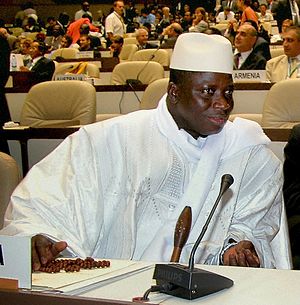Gambia’s exit from the Commonwealth has – Gambia’s accusation of neo-colonialism aside – raised question as to whether rights abuses drove Gambia to exit.
Last week, the Gambia withdrew from the Commonwealth after 48 years of membership. Cynical observers may not consider the lack of news coverage surprising. Critics have long derided the Commonwealth as a quaint and ineffective relic, whose sole purpose in the 21st century is to bolster Britain’s sense of importance on the international stage.
Some may find sympathy in Gambian President Yahya Jammeh’s accusation that the Commonwealth is a ‘neocolonial institution.’ While the withdrawal of the Gambia has highlighted concerns over the effectiveness of the Commonwealth as an organisation, rumours of its inevitable demise may be greatly exaggerated. The Commonwealth remains a valuable forum for political and economic co-operation, and will continue to remain so, provided that its weaknesses are addressed.
President of The Gambia, Yahya Jammeh claims withdrawal due to US and UK backing a coup against him.
The primary strength of the Commonwealth remains its membership, which includes members of the G20 and some of the poorest nations in the world. Many nations, particularly those that often do not have the influence or money to seek similar arrangements in larger forums such as the United Nations or the World Trade Organisation, still see membership of the Commonwealth as an opportunity to secure bilateral economic and diplomatic agreements with prominent economic powers such as Britain, India, Australia and Canada.
A healthy interest in joining the Commonwealth continues to persist. Rwanda became the 54th member of the Commonwealth in 2009 despite having no previous colonial links to Britain and several states, such as Sudan, South Sudan, Yemen, Suriname, Algeria and Madagascar, have either expressed interest in or made a formal application for membership in recent years. Aware of its indisputable colonial past, the Commonwealth has sought to reinvent itself as a voluntary association of member states committed to shared human and political values.
It is precisely this commitment to human and political values that explains the Gambia’s withdrawal. President Jammeh has long been considered one of the most eccentric and oppressive leaders in Africa. After taking power in a military coup in 1994 at the age of only 29, the former army lieutenant has won four consecutive multi-party elections despite accusations from the Economic Community of West Africa States (ECOWAS) of ‘an unacceptable level of control of the electronic media by the party in power, the lack of neutrality of state and para-statal institutions, and an opposition and electorate cowed by repression and intimidation.’
Beyond this, Jammeh has been the subject of international criticism for claiming that AIDS could be cured with herbal body rubs, threatening to behead homosexuals and ordering the execution of all criminals and political prisoners on the Gambia’s death row despite a 27-year moratorium on the death penalty. Far from being motivated by anti-colonial sentiment, this move appears to be more of a reply to British disapproval of Jammeh’s regime than a condemnation of the Commonwealth itself. A Foreign and Commonwealth Office report in 2012 singled out the Gambia for human rights abuses, and Jammeh previously accused Britain of backing his political opponents in the run-up to elections.
While the Gambia’s withdrawal may not be a symptom of the decline of the Commonwealth, this is not to say that the Commonwealth does not face significant challenges. Despite its aspirations to continue as a major international organisation with a wide-ranging mandate, the Commonwealth faces constraints due to a limited budget (less than 1 percent of what is allocated to Britain’s Department for International Development) and even fewer human resources (the entire Commonwealth organisation has fewer staff than the café at the United Nations headquarters). This lack of resources has led to an inability to truly practice what it preaches in terms of the promotion of human and political values, further diminishing both the perceived effectiveness of the Commonwealth and its international profile.
Only when violations of member states are particularly egregious (such as in the case of Apartheid South Africa, Zimbabwe or Fiji) has substantive action been chosen over simply voicing disapproval. It is also unclear whether member states of the Commonwealth are as committed to enforcing its values as they claim. Despite Sri Lanka’s unwillingness to improve its human rights record or launch a formal investigation of war crimes committed during its civil war, only Canada has announced that it will formally boycott the November 2013 Commonwealth Summit due to be held there.
Reforming the Commonwealth to allow it to continue to be a relevant force for economic and political development in the 21st century requires both a renewed commitment to the values they claim to uphold and a greater emphasis on economic cooperation and development as a benefit of membership.
Allowing human rights violations in Commonwealth states to continue without consequence may prevent further withdrawals from member states, but could also further erode public and donor support for the organisation. The Commonwealth’s unique selling point of bringing the most developed and least developed countries in the world together must be further leveraged. Enhanced economic aid agreements from developed Commonwealth states will help sweeten the pill of an increased assertion of Commonwealth moral authority for recipients.
The Commonwealth is also well placed to strengthen economic links between states in the developing world (known as ‘South-South development cooperation,’ or SSDC). SSDC among Commonwealth countries in 2009 alone was estimated at $827 million, incorporating programs such as the dairy improvement scheme between India, Tanzania and Uganda, the Indian Technical and Economic Cooperation Program and the Pan-African Infrastructure Development Fund. With its vast growth potential and its ability to do more with less by using cheaper and more relevant local expertise, proper expansion of SSDC combined with a renewed commitment to shared values may revive the Commonwealth as a body that can provide real and lasting political and economic change in the developed world.











